Article originally published on Search Engine Land.
Automation: It’s all the rage for established digital advertising platforms these days.
Take Google’s recent introduction and expansion of Performance Max, which simplifies campaign setup and management based on an advertiser’s goals, so instead of managing several campaigns across the various Google ad placements, it all sits under one.
At the core of its simplicity is the automation of budgeting, bidding, and in many cases, delivery. That means fewer decisions for humans and more reliance on machine learning to get advertisers optimal results.
You may be leery of turning more media buying decisions over to “the algorithm.” But it’s working.
Automation in Meta campaigns is not new. With the advent of campaign budget optimization, automated audience expansion, and dynamic creative, media planners are used to turning some (or many) decisions over to machine learning.
But beginning in March of this year, Meta has consolidated and rebranded its automation tools into what it now calls “Meta Advantage.” According to Meta, the purpose of the Meta Advantage suite of products is to “earn and sustain better results, personalize ad delivery and reduce work for advertisers.”
These products include the following, which I will outline in detail in this article:
Several more, including those below, are specific and nuanced and will be covered at a later time:
You’ll notice there are some Advantage products with a “+,” which begs the question, what’s the difference? It helps to think of it in terms of scale or depth of automation.
Advantage products will help you automate a specific part of your campaign’s operation, whereas Advantage+ products can go a little further.
Instead of one facet like budget allocation or audience expansion, Advantage+ products can automate entire campaigns (or a large portion of them) using machine learning. The plus, in this case, means more automation of more things.
Now, in detail, let’s look at a few of the most common Advantage and Advantage+ products.
Some Meta advertisers might remember “automatic expansion” as an option when you’re building audiences.
It was a toggle that allowed Facebook to “reach people beyond your detailed targeting selections when it’s likely to improve performance.”
You can find it in your ad set settings under the detailed targeting section.
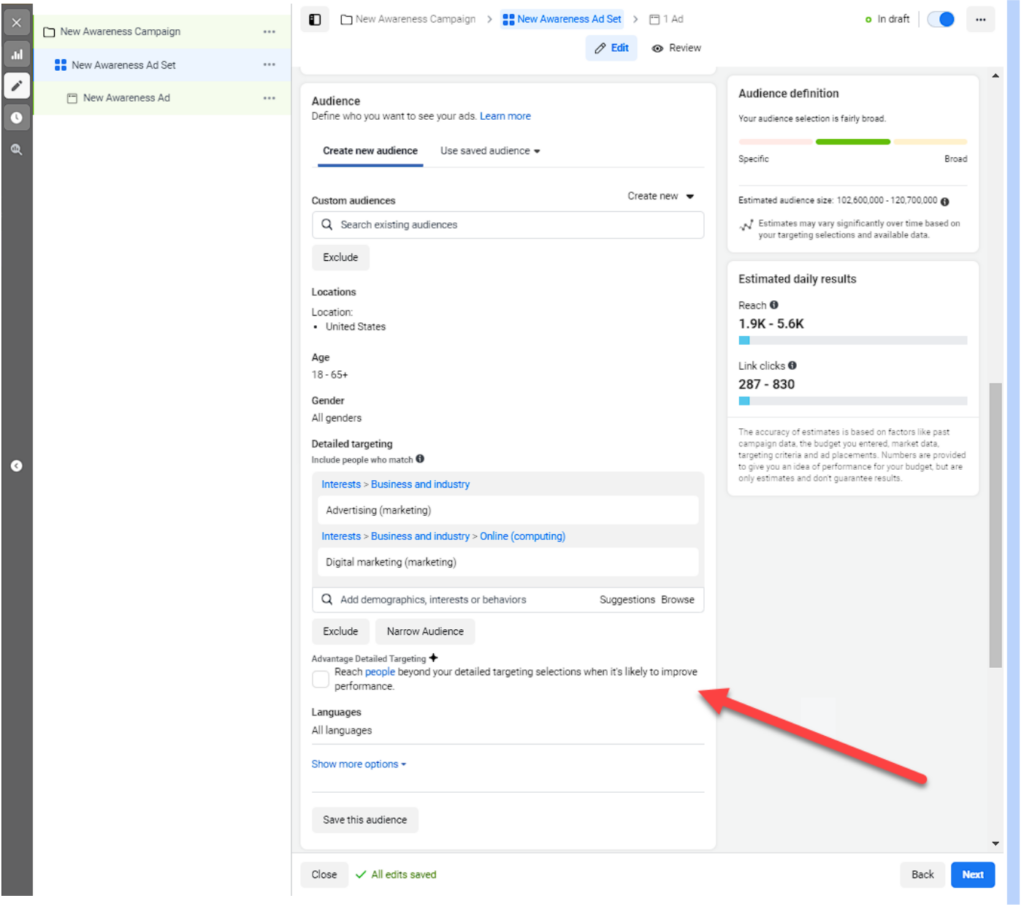
Enabling Advantage detailed targeting allows Meta to serve your ads to people outside your exact target audience. For instance, if you’ve selected people with an advertising or digital marketing interest, this may include additional interests that you did not select that are adjacent to your target audience.
However, please note that Meta will not advertise to detailed targeting interests that you’ve added as exclusions. Machine learning is a good way to extend and scale your campaigns beyond your core audiences.
The only “disadvantage” is that you won’t get any insights into what audiences Meta expanded into.
In some cases, you might have to. Advantage detailed targeting is automatically enabled when using the following objectives: conversions, app events, app installs, and message objectives.
But you can opt-out if you’re running a traffic, engagement, video views, lead generation, catalog sales, and store traffic objective.
Generally speaking, I’ve seen better cost-pers with Advantage detailed targeting enabled. So if you’re not deployed or testing already, you should.
Similar to Advantage detailed targeting, Advantage lookalike allows Meta to go beyond the exact reach of a lookalike you’ve created from a custom audience. Instead of only targeting those Meta users within the lookalike, Meta will use signals to identify other relevant users.
You can find it in your ad set settings under the custom audiences section.
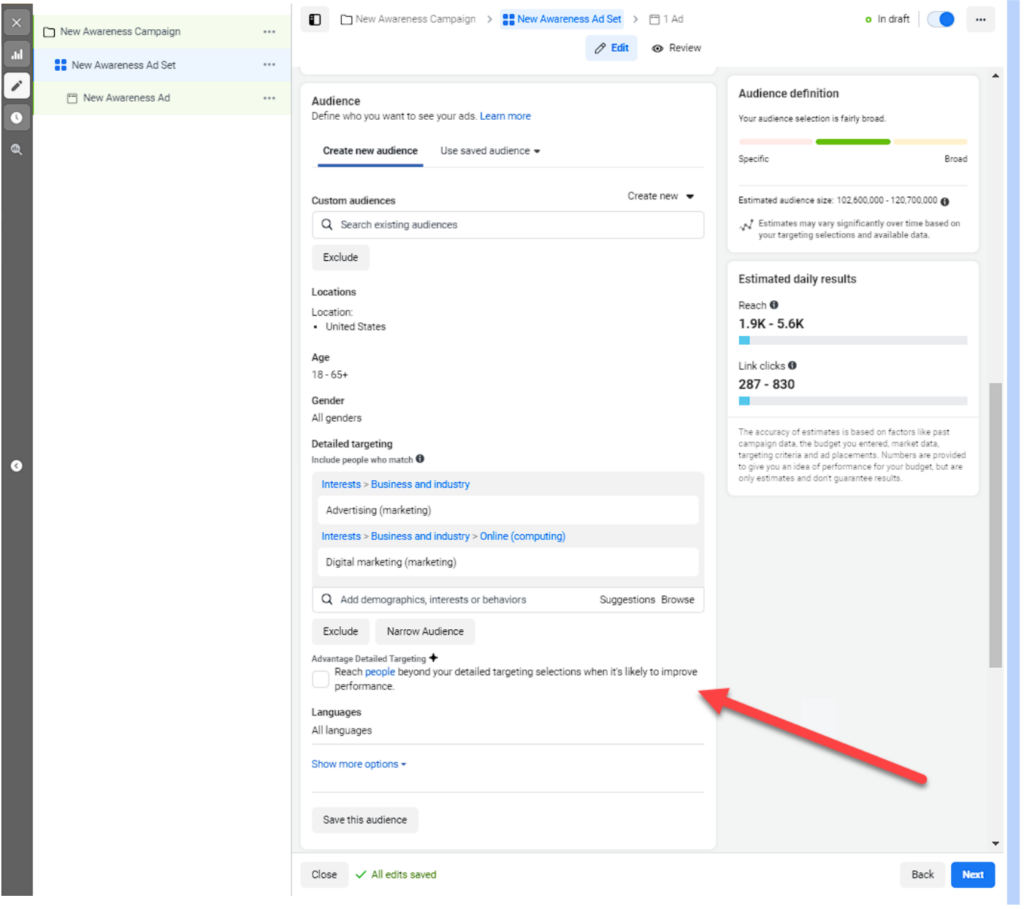
Lookalike audiences are created based on a percentage of the population of the country you’re trying to reach.
Therefore a 1% lookalike U.S. audience represents the 1% of people who most look like the audience you created them from.
Advantage lookalike expands that percentage to include audiences outside the initially defined percentage if Meta believes you’ll get better performance.
If you are using awareness, traffic, engagement, leads, app promotion, and sales objectives alongside lookalike audiences based on mobile, website, or customer list custom audiences, you may have to.
Otherwise, I would exercise caution and test it.
In a Meta platform with increasingly sophisticated conversion optimization, the role of lookalike audiences has been diminished. Most of the time, you can see better cost-pers with broader audiences and expansion.
Lookalike audiences have served as a quality vs. quantity audience, but if their performance has stalled, you should consider testing Advantage lookalike. Just be mindful of lead or conversion quality versus larger/broader audiences.
Most Meta advertisers are familiar with campaign budget optimization (CBO), which is what this essentially is.
Instead of setting individual daily or lifetime budgets for the various ad sets under a campaign, Advantage campaign budget allocates spend based on performance to maximize efficiency.
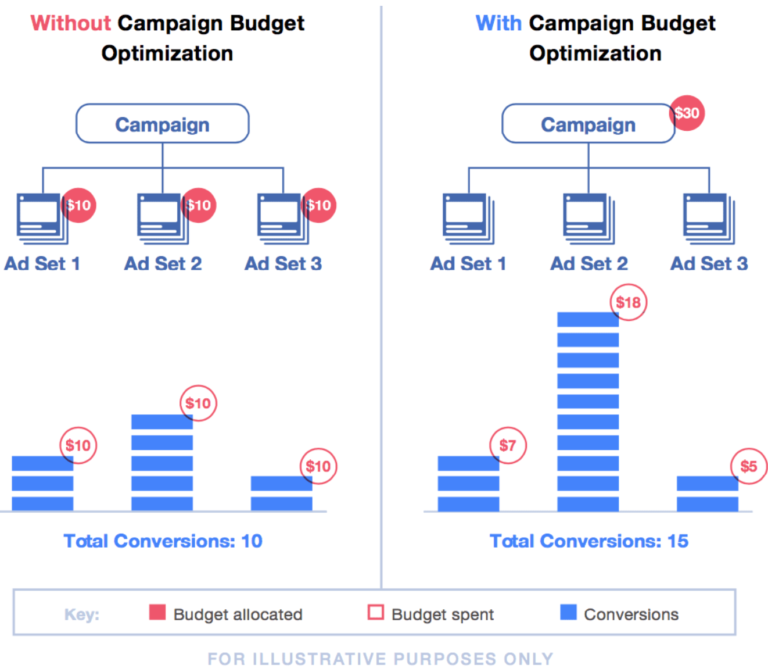
In the campaign settings section at the bottom.
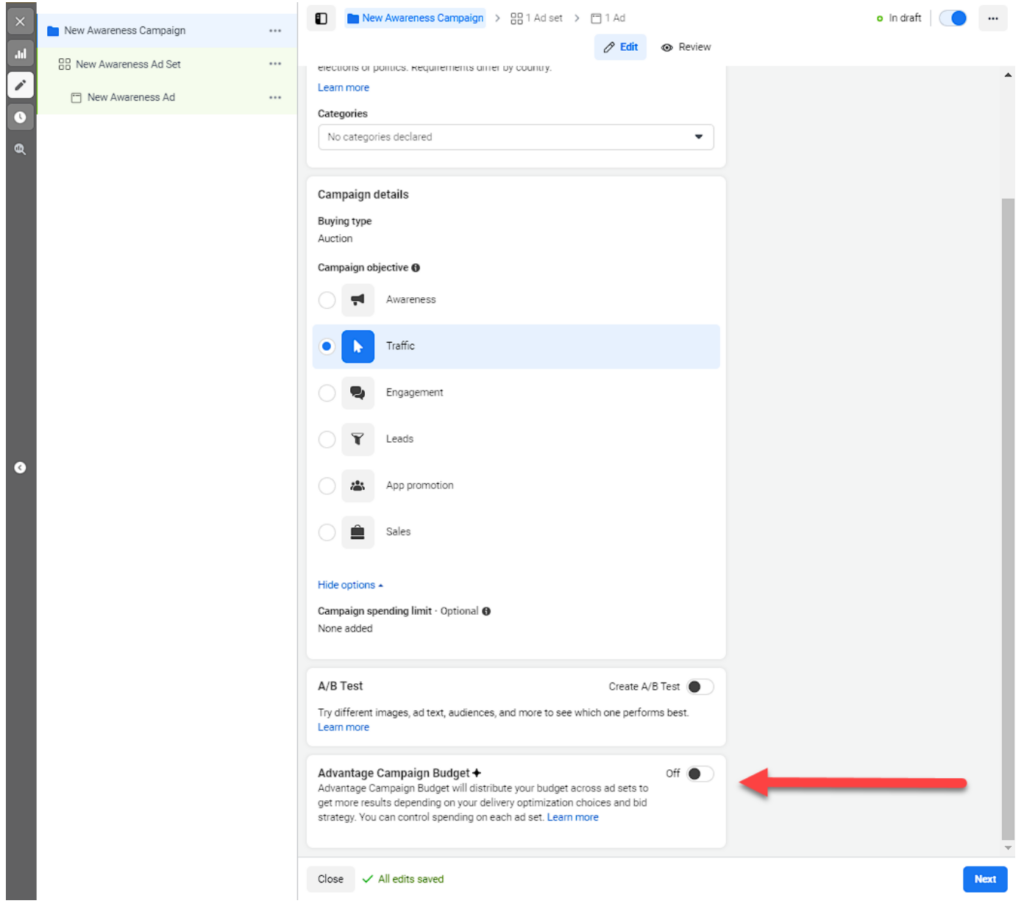
This is one of the earliest and most significant Facebook automation products.
Instead of manually creating and constantly adjusting ad set-level budgets for campaigns based on performance, Advantage budget optimization uses machine learning to do the same in real time.
This way, Meta is constantly adjusting your budget mix based on which audiences are giving you the best efficiency for your objective while also considering factors like audience size and scalability.
I’m a big proponent of CBO as it eliminates one of the most manual aspects of campaign management: budget allocation. If you’re new to Facebook advertising or have different audiences you’re running spend against, you should use it.
Advantage campaign budget is a “trust but verify” enhancement. I’ll always default to it but regularly check in on its performance. It’s an efficiency and volume play, so if you’re working on advertising a product where lead quality is a concern, you may not see the best results.
It also tends to allocate spend (understandably) toward the largest audience. So if you see smaller audiences like retargeting pools getting little love, consider spinning those off into a different campaign.
Formerly known as automatic placements, Advantage+ placements allows Meta to select where your ads will run across the various units available on Facebook, Instagram, and the Audience Network.
In the ad set settings section, under the detailed targeting section.
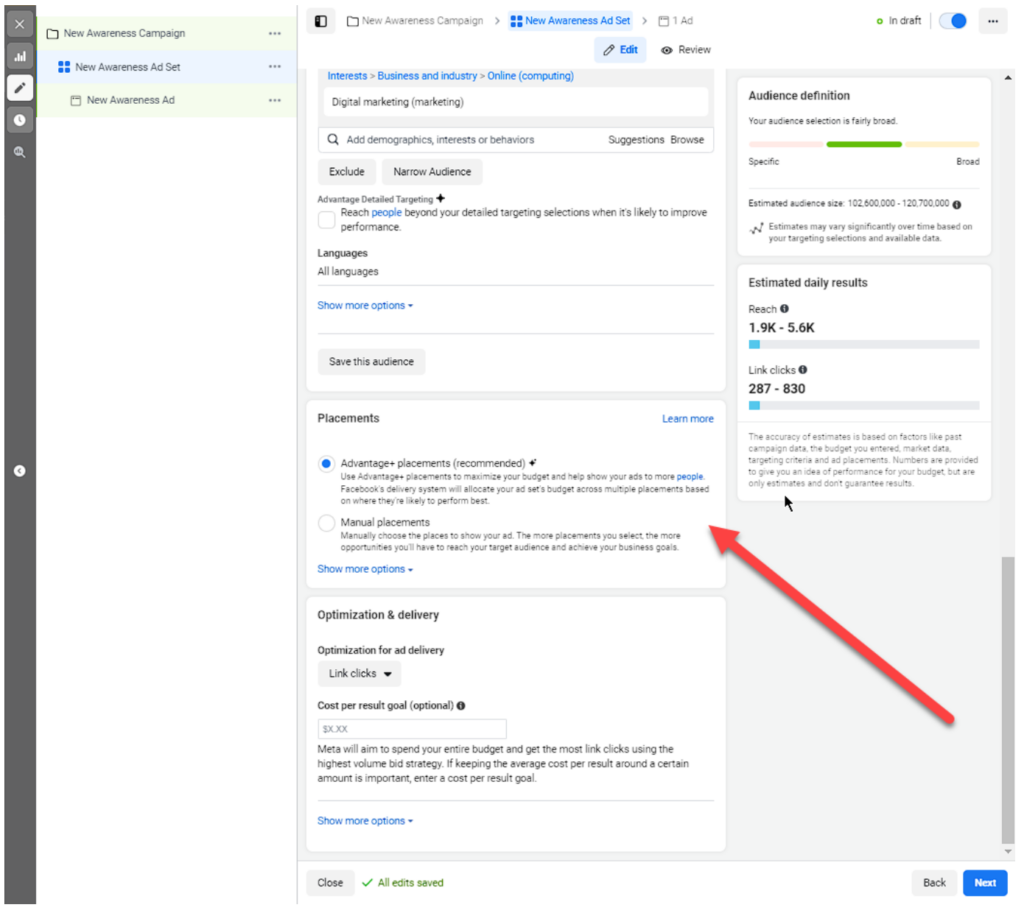
This is where automation and machine learning play a significant role in campaign setup and management. Advantage+ placements automates where your ads will be seen.
Most new or inexperienced advertisers look at Meta and think of Facebook and Instagram news feeds as being the primary place where ads are shown. While those placements make up the bulk of spend and impressions, there are over 25 total “placements” where ads could be shown.
This will automate the selection of which placements Meta will serve ads based on performance.
The answer depends on how tightly you want to control how your creative is shown to audiences.
Different placements have different sizes and configurations, so if you’re using a standard 1:1 aspect ratio image or video, your ad will look different in the news feed compared to something less common, like Facebook Business Explore.
Running ads on different placements will expand your reach and give you a better cost-per. So if you’re not as concerned about the exact composition of your ad and want to lower costs possibly, it’s worth a test.
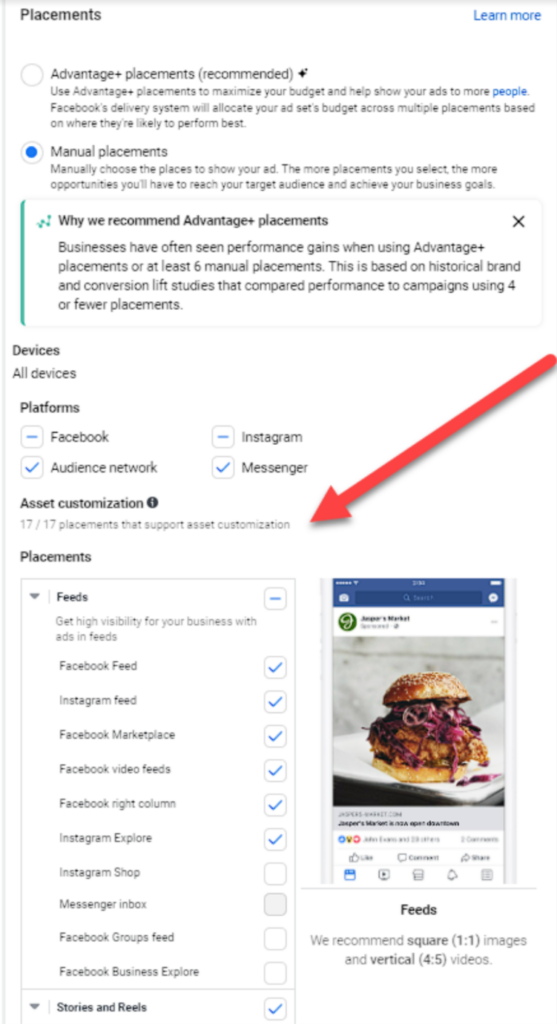
Advantage+ creative, for most advertisers, might be the biggest leap in creative automation seen on the Meta platform. You may have previously encountered “dynamic experiences” while creating ads, but Advantage+ creative offers a lot more, including:
Image/Video enhancements:
Ad unit enhancements:
The intent is to update and customize ads’ visual representation in various ways to improve the overall quality and results.
Below are a few examples of how this might look:
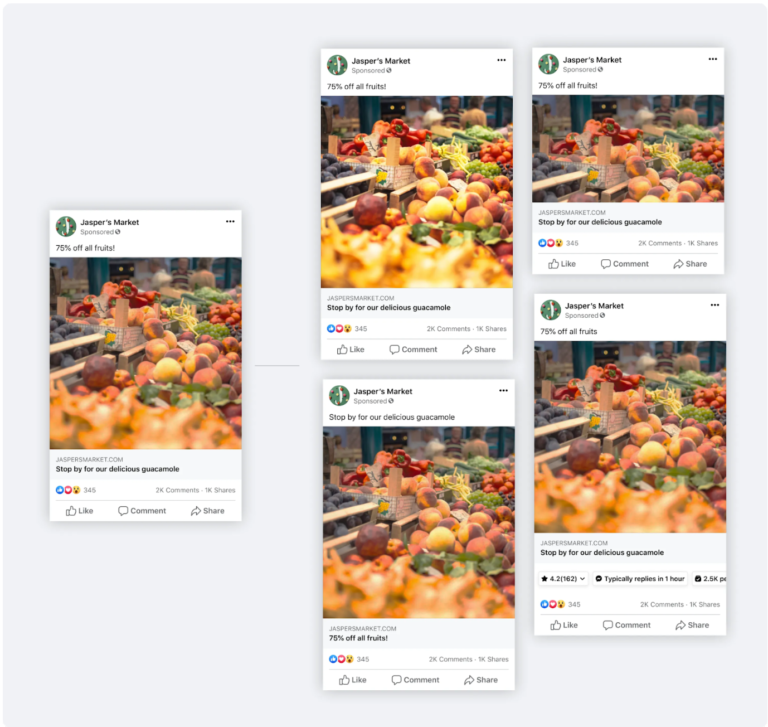
In the ad settings, under the ad setup section, under Standard enhancements. Or, a more detailed list of potential enhancements will be shown when you upload an image or video.
This way, Meta is constantly adjusting your budget mix based on which audiences are giving you the best efficiency for your objective while also considering factors like audience size and scalability.
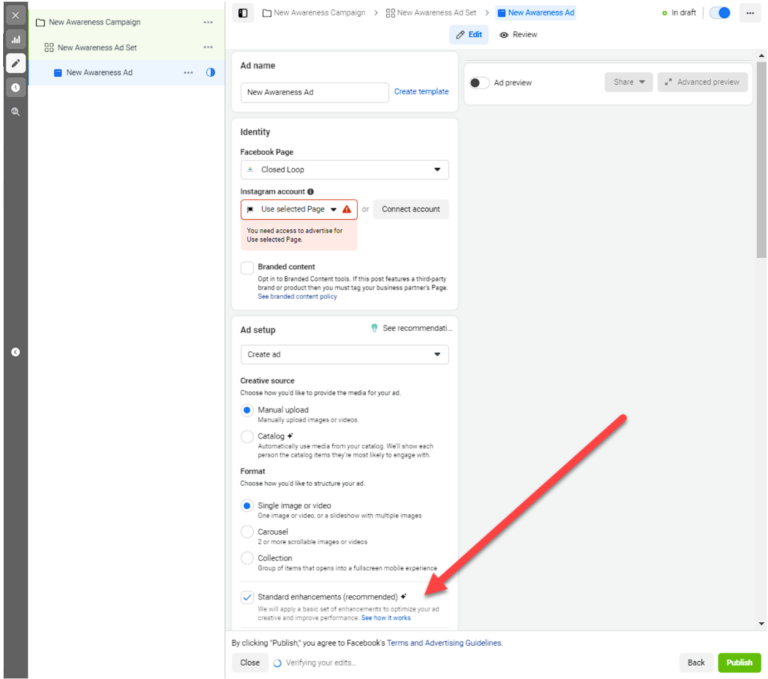
Quite a bit. Put simply, it gives Meta creative flexibility to enhance your ad creative in numerous ways to improve performance. If this is your first time using Advantage+ creative, you will likely see a screen like the one below when you upload a new asset:
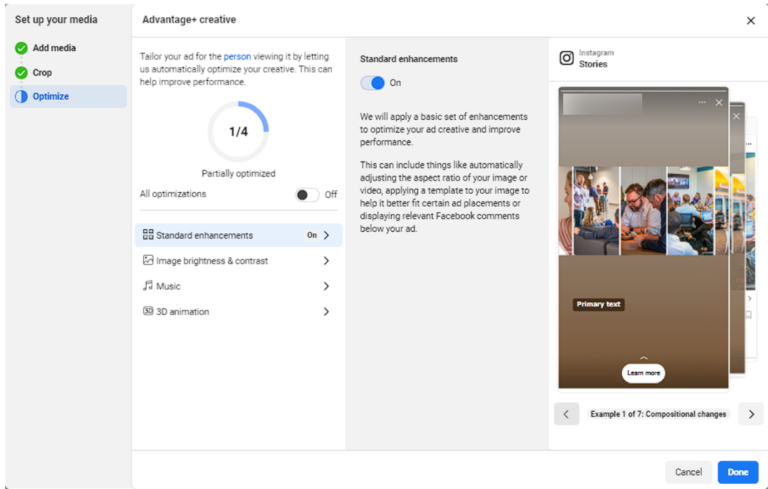
Given the highly customized nature of creative and the number of potential “enhancements,” Meta gives advertisers more granular control over what they can and cannot do.
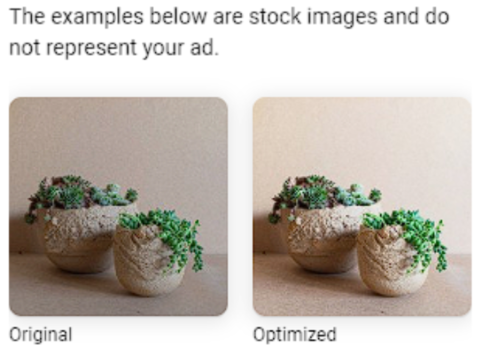
There are four main sections:
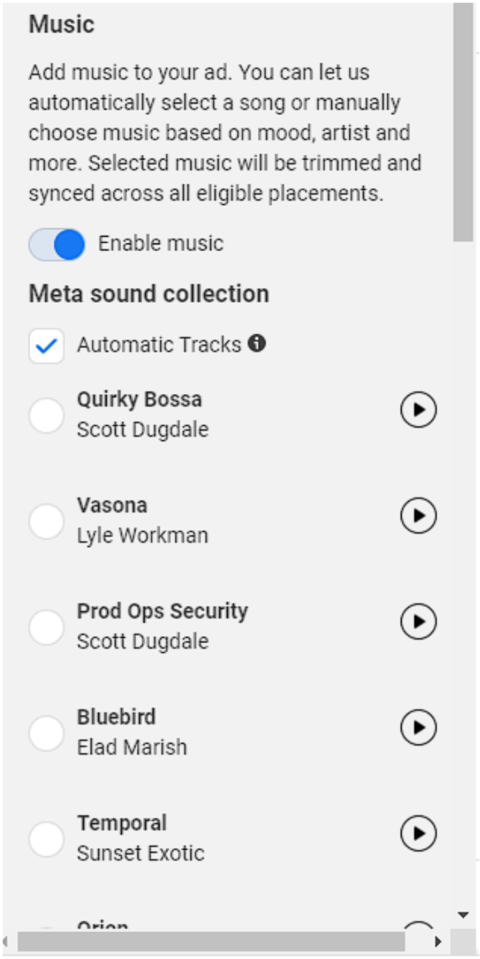
Like the Advantage+ placements example, this will depend largely on the advertiser and the brand’s desire to control the look and feel of their ads. Our initial tests of standard enhancements and image brightness and contrast have shown a somewhat modest improvement in click-through rate (CTR).
But the “black box” that is Facebook’s machine learning and optimization engine leaves advertisers with precious few insights.
This is truly one of those situations where you’re putting a tremendous amount of faith and trust in “the system” to make sometimes wholesale changes to your ad creative. I would exercise caution and test only with the approval of all creative and brand partners to minimize potential issues.
If you test Advantage+ creative, I recommend doing so slowly and methodically.
Start with a specific enhancement, test it and add additional enhancements to better understand the impact these creative optimizations may have on your performance.
Through its suite of Advantage and Advantage+ products, Meta offers advertisers an unprecedented level of automatic optimization to improve and sustain performance.
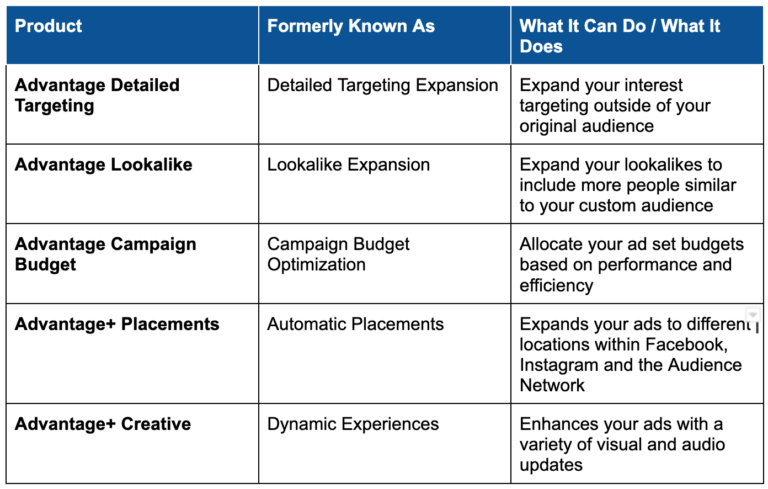
Many of these products will be familiar to seasoned advertisers, but some offer new ways to automate many important campaign decisions and optimizations like budget, placement, and creative.
Each product offers benefits, risks, and rewards for turning the decision-making over to Meta’s machine learning. But on the whole, they should be considered as part of your long-term optimization strategy as they have proven value.
Advantage+ placements and Advantage+ creative, in particular, have far-reaching creative implications that should be discussed with all shareholders before you permit Meta to change what your ads look (and sound like), and where they’re served.
All the latest digital advertising tips and industry insights delivered to your inbox every quarter
Running campaigns without Offline Conversion Tracking is like fishing blind—uncertain and inefficient. Learn how OCT connects CRM data to ad platforms, helping CMOs optimize for real business impact, from quality leads to closed deals.

The B2B landscape is relentless, and mediocre video production won’t cut it. Learn why scaling high-quality video production is essential to drive ROI, stand out, and stay competitive in today’s paid media game.

Misaligned metrics and fragmented strategies aren’t just inconvenient—they’re costing your marketing team revenue and results. Explore the root causes of data chaos and learn how to align your metrics for paid media success.